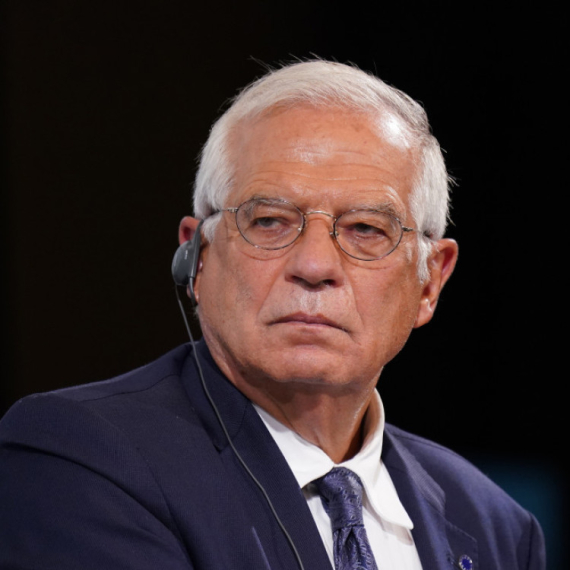France and Germany exit recession
The French and German economies both grew by 0.3% between April and June, bringing to an end year-long recessions in two of Europe's largest economies.
Thursday, 13.08.2009.
12:08

The French and German economies both grew by 0.3% between April and June, bringing to an end year-long recessions in two of Europe's largest economies. "The data is very surprising. After four negative quarters France is coming out of the red," said French Finance and Economy Minister Christine Lagarde. France and Germany exit recession Few analysts expected the economies to come out of recession this early. But economic activity in the eurozone fell by 0.1%, showing the region as a whole is still in recession. The contraction was a marked improvement on the 2.5% drop recorded in the first three months of the year, and was smaller than economists had expected. It was the fifth consecutive quarter of eurozone economic contraction. Both the French and German economies last grew in the first quarter of 2008. The German economy, Europe's largest, contracted by a revised 3.5% in the first three months of the year. And while exports rose 7% in June, the fastest pace in nearly three years, few analysts had expected a return to overall economic growth so quickly. The country's Federal Statistics Office said that household and government expenditure had boosted growth. Ulf Sauerwald, chief executive of plastics manufacturer Wirthwein Nauen, says his business is growing. "Turnover in the whole group increased from 15 to 20% at the start of the year. We've had major new orders coming in, have developed new products in the car sector and are planning to open a new factory in Spain." But the workers on the factory floor are not seeing a recovery yet. "My staff... don't get paid overtime and they don't buy expensive stuff like cars," says Christopher Schmidt. It added that imports had declined "far more sharply than exports, which had a positive effect on GDP growth". Analyst reaction to Germany's recovery was mixed. "The recession has ended, and it has ended sooner than we all thought. We expect to see growth of 1% in the third quarter, which is very strong for Germany, and I wouldn't rule out the chance of even better growth," said Andreas Rees at Unicredit. Others were more circumspect, arguing that the economy is over-reliant on government stimulus packages. "What we're seeing is the impact of fiscal policy. The question is how lasting [the recovery] will be. There are lots of problems we haven't solved. In particular, the banking sector is still reliant on the state umbrella," said Jens-Oliver Niklasch at LBBW. "As long as it's not clear that the bank's capital base is robust, we can't assume that the crisis is over." France's economy had contracted by a revised 1.3% in the first quarter. Lagarde said that consumer spending and strong exports had helped to pull France out of recession. "What we see is that consumption is holding up," she said. Official figures showed that household consumption rose by 0.4% in the second quarter. She said government incentive schemes for trading in old cars, together with falling prices, were helping consumers. Foreign trade contributed 0.9% to the GDP figure - a "very strong impact", said Ms Lagarde. "[The figures are] a positive surprise, as many people were expecting slightly negative numbers," said Marie Diron at Oxford Economics. But she warned that growth is "still very fragile". "Investment is down, we still have surprisingly low stocking, and growth is boosted by the fact that imports fell sharply," she added.
France and Germany exit recession
Few analysts expected the economies to come out of recession this early.But economic activity in the eurozone fell by 0.1%, showing the region as a whole is still in recession.
The contraction was a marked improvement on the 2.5% drop recorded in the first three months of the year, and was smaller than economists had expected.
It was the fifth consecutive quarter of eurozone economic contraction.
Both the French and German economies last grew in the first quarter of 2008.
The German economy, Europe's largest, contracted by a revised 3.5% in the first three months of the year.
And while exports rose 7% in June, the fastest pace in nearly three years, few analysts had expected a return to overall economic growth so quickly.
The country's Federal Statistics Office said that household and government expenditure had boosted growth.
Ulf Sauerwald, chief executive of plastics manufacturer Wirthwein Nauen, says his business is growing.
"Turnover in the whole group increased from 15 to 20% at the start of the year. We've had major new orders coming in, have developed new products in the car sector and are planning to open a new factory in Spain."
But the workers on the factory floor are not seeing a recovery yet.
"My staff... don't get paid overtime and they don't buy expensive stuff like cars," says Christopher Schmidt.
It added that imports had declined "far more sharply than exports, which had a positive effect on GDP growth".
Analyst reaction to Germany's recovery was mixed.
"The recession has ended, and it has ended sooner than we all thought. We expect to see growth of 1% in the third quarter, which is very strong for Germany, and I wouldn't rule out the chance of even better growth," said Andreas Rees at Unicredit.
Others were more circumspect, arguing that the economy is over-reliant on government stimulus packages.
"What we're seeing is the impact of fiscal policy. The question is how lasting [the recovery] will be. There are lots of problems we haven't solved. In particular, the banking sector is still reliant on the state umbrella," said Jens-Oliver Niklasch at LBBW.
"As long as it's not clear that the bank's capital base is robust, we can't assume that the crisis is over."
France's economy had contracted by a revised 1.3% in the first quarter.
Lagarde said that consumer spending and strong exports had helped to pull France out of recession.
"What we see is that consumption is holding up," she said.
Official figures showed that household consumption rose by 0.4% in the second quarter.
She said government incentive schemes for trading in old cars, together with falling prices, were helping consumers.
Foreign trade contributed 0.9% to the GDP figure - a "very strong impact", said Ms Lagarde.
"[The figures are] a positive surprise, as many people were expecting slightly negative numbers," said Marie Diron at Oxford Economics.
But she warned that growth is "still very fragile".
"Investment is down, we still have surprisingly low stocking, and growth is boosted by the fact that imports fell sharply," she added.
















Komentari 3
Pogledaj komentare